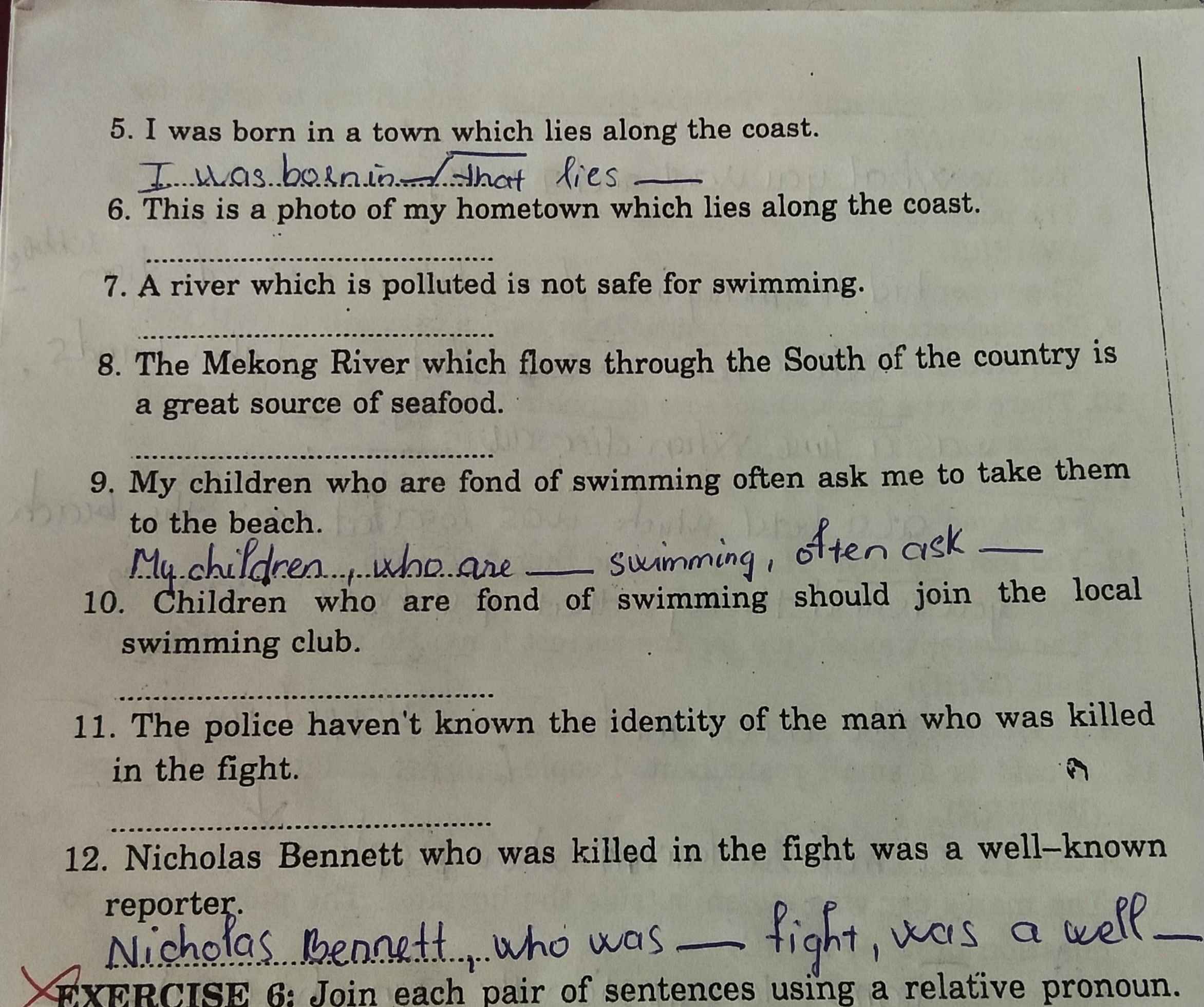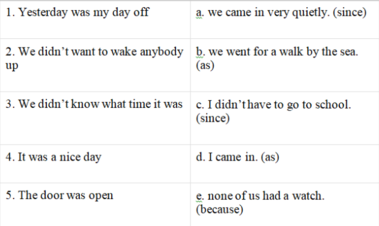A. GRAMMAR
I. Fill in the relative pronoun or adverb. Put commas where necessary. Write I for identifying, NI for non-identifying and say whether the relative can be omitted or not.
1. The dress .............................. she bought was too big.
2. Mrs Stewart ........................ was the school’s head mistress for ten years has retired now.
3. This is the kitten .............................. I found in my garden.
4. Martin Reeds ........................... was born the same year as I was is a distinguished author.
5. Pauline Smith ........................... was in my class at school is a very successful lawyer now.
6. The library .............................. they knocked down yesterday was in very bad condition.
7. The car .............................. I bought last year is a red Ferrari.
8. Have you read the book ........................ was written by one of the professors from my
university?
9. That’s the man .............................. dog buried a bone in my vegetable garden.
10.My garden .............................. I like very much looks beautiful when all the flowers bloom.
11.I know a girl .............................. goes skiing in Switzerland every winter.
12.Jane .............................. I don’t know very well is very good at her job.
13.The woman .............................. we spoke to is called Claire.
II. Complete each sentence using relative clauses and the prompts below, as in the example.
Add commas where necessary.
Alan works in a clothes shop in Main Street
Pamela ate at a beautiful restaurant when she was in London
you sent the parcel to the wrong address
you recommended a film to me
Frank lives in a tiny village
Kim entered a talent competition
14.Do you know the name of the beautiful restaurant ... which/that Pamela ate at ... when she
was in London?
15.The tiny village ....................................................................................................... is beside the
sea.
16.What’s the name of the film ................................................................................... ?
17.The clothes shop ................................................................................................... is in Main
Street.
18.Kim is delighted. She won the talent competition ........................................................................
19.The address ............................................................................................................... is wrong.
III. Rewrite the direct questions as indirect questions.
20.Is this the right road for Brighton?
Can you tell me ..............................................................................................................?
21.Where can I get a bus to Camden Market?
Do you know ..................................................................................................................?
22.Will I have to wait long?
Could you tell me ...........................................................................................................?
23.How long does the journey take?
Can you tell me ..............................................................................................................?
24.Has the film started?
Do you know ..................................................................................................................?
25.How much does a ticket cost?
Could you tell me ...........................................................................................................?
26.Is there a telephone box near here?
Do you know ..................................................................................................................?
27.Does this train go to Oxford?
Could you tell me ...........................................................................................................?
IV. Circle the correct answer.
28.It wasn’t very warm at the weekend, was / wasn’t it?
29.Chloe’s invited you to the party, isn’t / hasn’t she?
30.I didn’t pass the exam, did / didn’t I?
31.You weren’t listening to me, were / did you?
32.We can’t get into the club with jeans on, do / can we7.
33.The last bus goes at ten o’clock, isn’t / doesn’t it?
34.He isn’t very happy, is / isn’t he?
35.You’ll see Lewis tomorrow, don’t / won’t you?
36.They hadn’t been to America before, had / hadn’t they?
B. VOCABULARY
I. Choose the correct answer.
52. There are no vegetarian dishes on the ..............
A. leaflet B. brochure C. catalogue D. menu
53. .......... the onions in cooking oil until they’re golden brown.
A. Boil B. Bake C. Fry D. Grill
54. Pre-heat the ............ to 200oC.
A. oven B. kitchen C. cuisine D. cook
55. I’ll ............ the washing-up tonight!
A. make B. take C. do D. have
56. The problem with most fizzy drinks is that they’re ............ sugar.
A. full up B. filled up with C. filled with D. full of
57. Susie and Fran ................ in on us last night, so I had to quickly defrost a pizza.
A. turned B. dropped C. came D. went
C. READING
Look at the sentences below about a project to learn more about ocean wildlife. Read the text on the opposite page to decide if each sentence is correct or incorrect. If it is correct, mark A on your answer sheet. If it is not correct, mark B on your answer sheet.
58. Tessa found out about the ocean wildlife project from her biology teacher at school. ............
59. Tessa’s trip cost considerably more than a holiday in a diving resort. ............
60. Tessa had to collect information that would help researchers studying climate change. ............
61. The place where Tessa stayed was specially built for people working on the project. ............
62. Some group members were unhappy about certain activities that they were asked to do. ...........
63. Group members were tested on their knowledge before they could collect information for the
scientists. .........
64. Tessa’s group were pleased to spend some of their time teaching local schoolchildren. ...........
65. Tessa’s group visited other parts of the island by car and bus. ...........
66. Tessa took advantage of the many opportunities to relax on the beach at weekends. ............
67. Tessa found it difficult to deal with the limited range of food available at the camp. ...........
OCEAN RESEARCH
Tessa Watt's biology teacher was delighted when Tessa told him she was joining a special project she’d seen on a biology website. The project offered young people the chance to take part in sea-life research in a specially protected area around an island in the Indian Ocean for a month during the summer.
The place was known for its beauty, but the work was challenging. However, part of it involved going diving daily so though Tessa's parents had to pay a lot for her flight there, it still wasn't as much as a week’s holiday in any diving resort. To join, a diving certificate was essential, and although Tessa already had one, she hadn’t done any diving for a while, so had to spend time in the water before her adventure.
The project she joined was solving a real problem. The level of ocean coral - a hard pink or white structure made up of millions of tiny sea creatures - had reduced by up to 90%, following unusual weather in previous years, possibly caused by global warming. The project's divers had to discover how many different coral types were present in the sea and how healthy they looked. This information was sent to international scientists to help them learn about the effects of rising temperatures on these creatures.
Tessa’s home for the month was an old camp now used by the project's professional staff, and people who, like Tessa, were working there as students rather than employees. Tessa and other group members quickly learnt the camp routine, which, in addition to tasks like putting information onto the computer and checking the boats, included housework. Several people tried to avoid this, complaining that they were just there to help with research, but the organisers soon explained what was expected.
There was also studying to do, with everyone needing to prove they could identify different corals before being allowed out to sea without a staff-member.
It wasn’t all work though: Tessa's group explored parts of the jungle with experts, and made visits to a nearby school where they were taught more about the island by the children themselves. Trips further out were limited to weekends, and although Tessa and her friend occasionally hired cars to enjoy the island's beaches, they generally caught crowded local buses into the island's capital, as there was little time to do more.
A lot of work was needed to keep the camp running and everyone supplied with meals. They had very simple ingredients, and preparation wasn't helped by having a basic kitchen. For Tessa, however, the whole experience was incredible. She learnt that she could do more than she thought possible, and made many new friends.
Các bạn ơi mik đang cần gấp, bạn nào làm đúng mik tick cho. Mik cảm ơn trước ạ



add commas where necessary . change the adj clause pronoun to '' that '' if possible
[ Thêm dấu phẩy khi cần thiết. thay đổi đại từ điều khoản thành '' đó '' nếu có thể ]]
1 , The geologist =>, who lectured at Browing Hall last night predicted another earthquake2 , Dr . Fields =>,who lectured at Browing Hall last night predicted another earthquake
3 , Only people =>,who speak Russian shoul apply for the job
4 , Matthew =>,who speaks Russian applied for the job
5 , The rice =>,which we had for dinner last night was very good
6 , Rice =>,which is grown in many countries is a staple food throughout much of the world
7 , I've fond memories of my hometown =>,which is situated in a valley
8 , I live in a town =>,which is situated in a valley
ko có that hả bạn ?